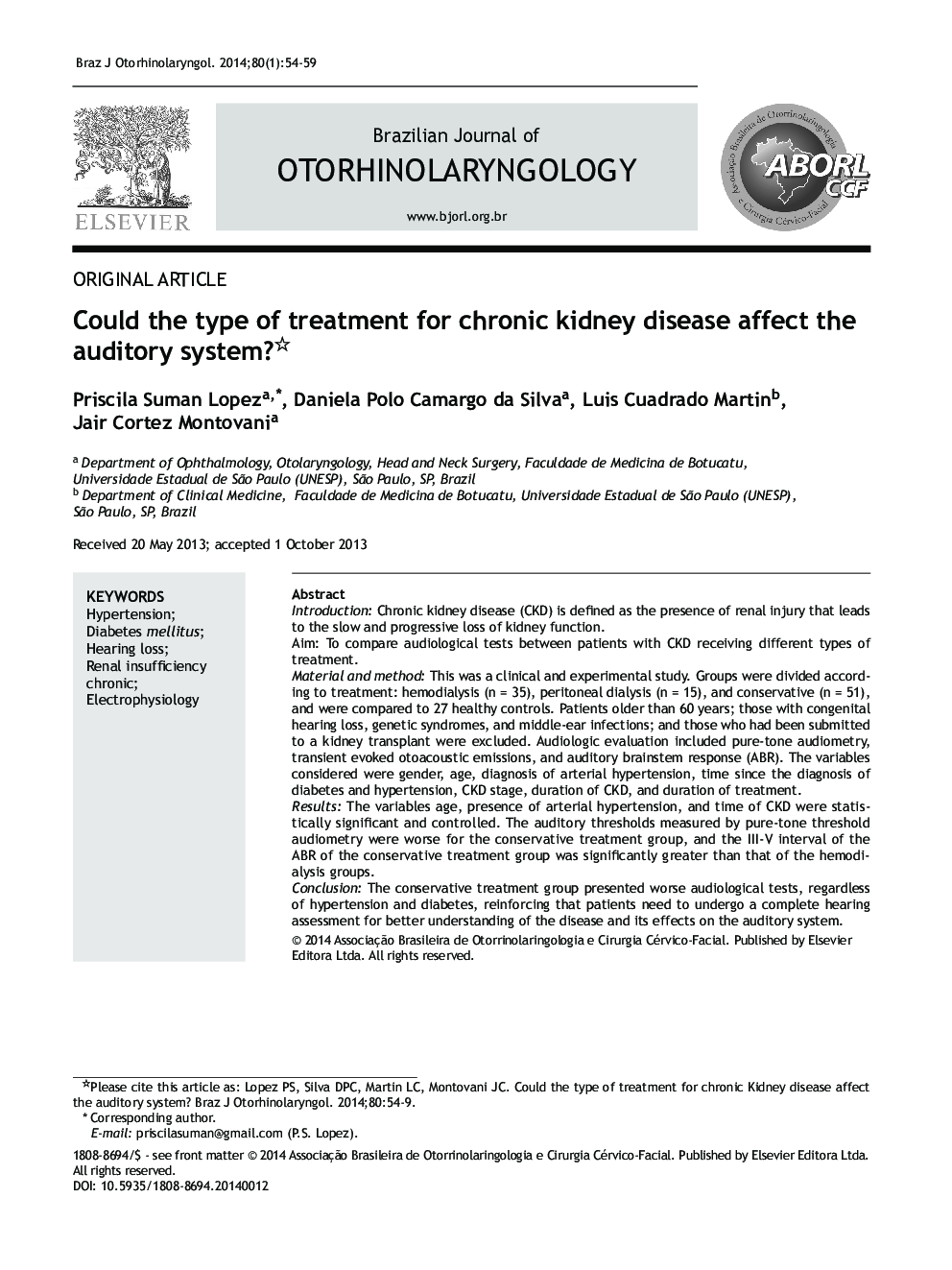| کد مقاله | کد نشریه | سال انتشار | مقاله انگلیسی | نسخه تمام متن |
|---|---|---|---|---|
| 4106598 | 1605376 | 2014 | 6 صفحه PDF | دانلود رایگان |
IntroductionChronic kidney disease (CKD) is defined as the presence of renal injury that leads to the slow and progressive loss of kidney function.AimTo compare audiological tests between patients with CKD receiving different types of treatment.Material and methodThis was a clinical and experimental study. Groups were divided according to treatment: hemodialysis (n = 35), peritoneal dialysis (n = 15), and conservative (n = 51), and were compared to 27 healthy controls. Patients older than 60 years; those with congenital hearing loss, genetic syndromes, and middle-ear infections; and those who had been submitted to a kidney transplant were excluded. Audiologic evaluation included pure-tone audiometry, transient evoked otoacoustic emissions, and auditory brainstem response (ABR). The variables considered were gender, age, diagnosis of arterial hypertension, time since the diagnosis of diabetes and hypertension, CKD stage, duration of CKD, and duration of treatment.ResultsThe variables age, presence of arterial hypertension, and time of CKD were statistically significant and controlled. The auditory thresholds measured by pure-tone threshold audiometry were worse for the conservative treatment group, and the III-V interval of the ABR of the conservative treatment group was significantly greater than that of the hemodialysis groups.ConclusionThe conservative treatment group presented worse audiological tests, regardless of hypertension and diabetes, reinforcing that patients need to undergo a complete hearing assessment for better understanding of the disease and its effects on the auditory system.© 2014 Associação Brasileira de Otorrinolaringologia e Cirurgia Cérvico-Facial. Published by Elsevier Editora Ltda. All rights reserved.
ResumoIntroduçãoDoença renal crônica (DRC) é definida pela presença de lesão renal levando à perda lenta e progressiva da função renal. A influência do tratamento da DRC sobre a audição ainda é inconclusiva.ObjetivoComparar testes auditivos entre pacientes com DRC submetidos a diferentes tipos de tratamento.Material e métodoCohort transversal. Os grupos foram divididos de acordo com o tratamento: hemodiálise (n = 35), diálise peritoneal (n = 15), conservador (n = 51) e 27 pacientes saudáveis (controle). Pacientes com idade superior a 60 anos, perda auditiva congênita, síndromes genéticas, infecções de orelha média e transplante renal foram excluídos da pesquisa. A avaliação audiológica incluiu audiometria tonal, emissões otoacústicas evocadas transientes e Potencial Evocado Auditivo de Tronco Encefálico (PEATE); e as variáveis avaliadas foram: sexo, idade, diagnóstico de hipertensão arterial e diabetes, estadiamento da DRC, tempo de diagnóstico do diabetes e da hipertensão arterial, duração da DRC e do tratamento.ResultadosA idade, presença de hipertensão arterial e tempo de DRC foram estatisticamente significantes e controlados. O grupo conservador apresentou piores limiares auditivos na audiometria tonal e o intervalo III-V do PEATE significativamente maior que o da hemodiálise.ConclusãoO tratamento conservador mostrou piores resultados na avaliação auditiva, independente de diabetes e de hipertensão, reforçando que os pacientes submetidos a tratamento para DRC merecem avaliação auditiva completa para melhor compreensão da doença e de seus efeitos sobre o sistema auditivo.
Journal: Brazilian Journal of Otorhinolaryngology - Volume 80, Issue 1, January–February 2014, Pages 54–59
